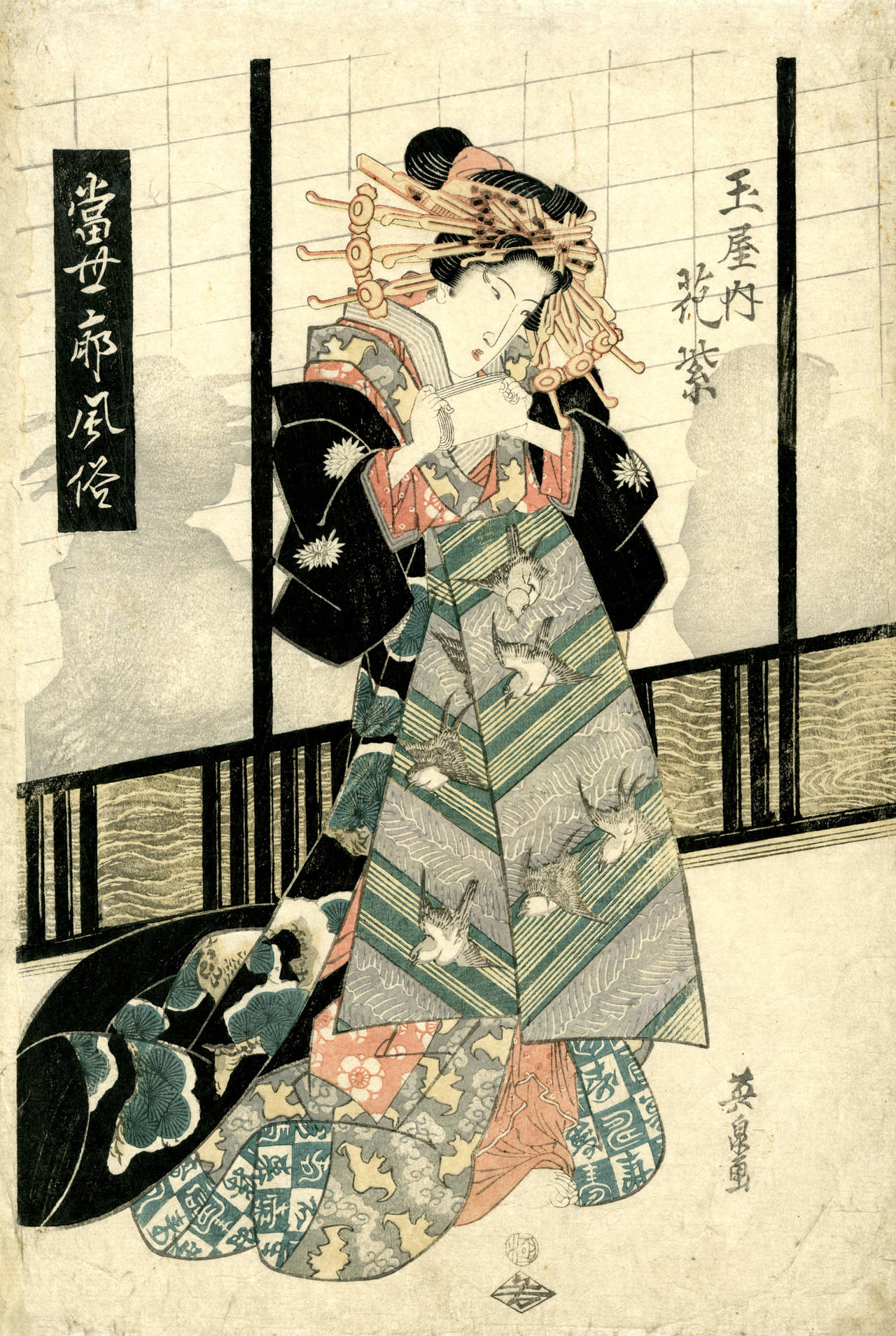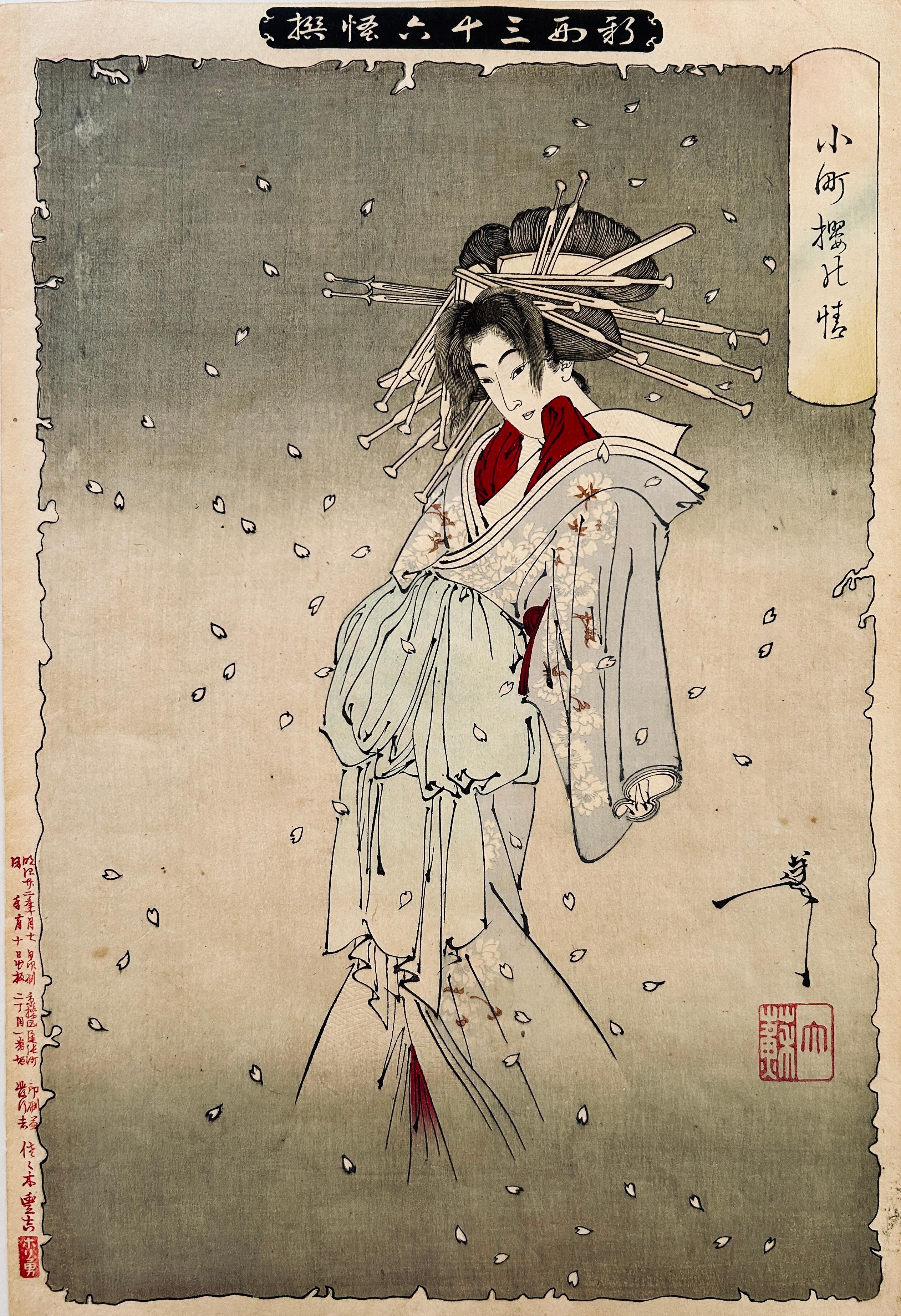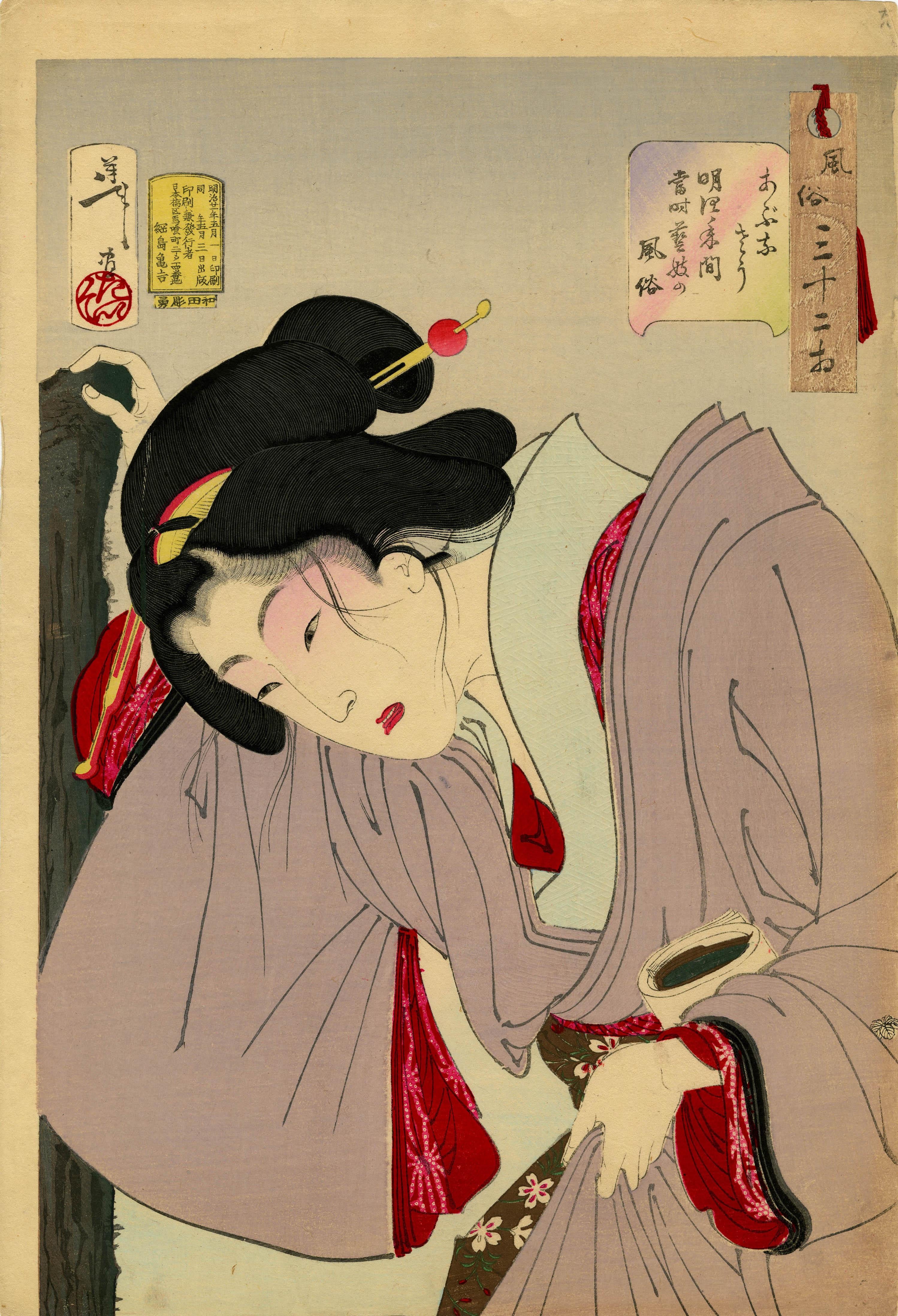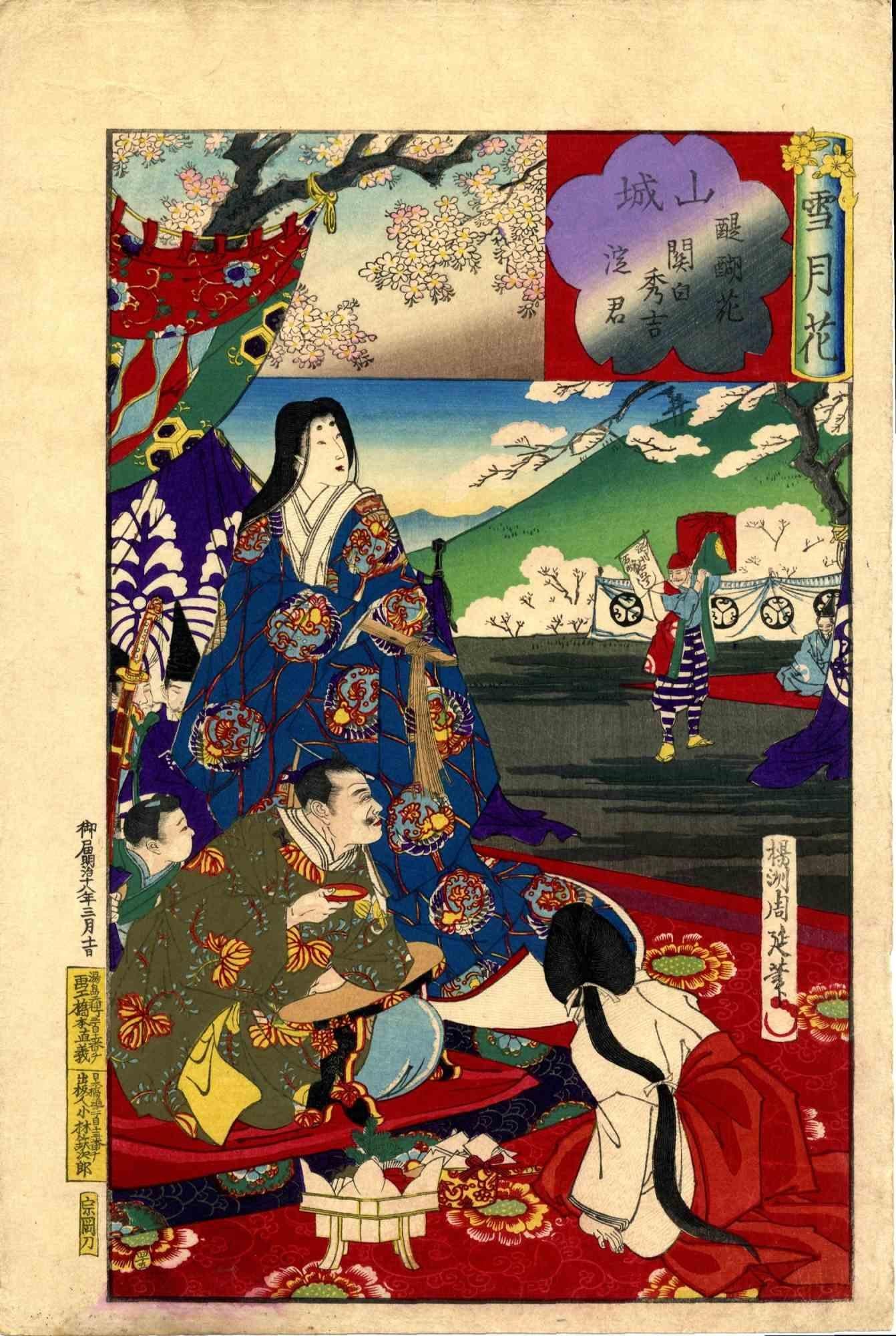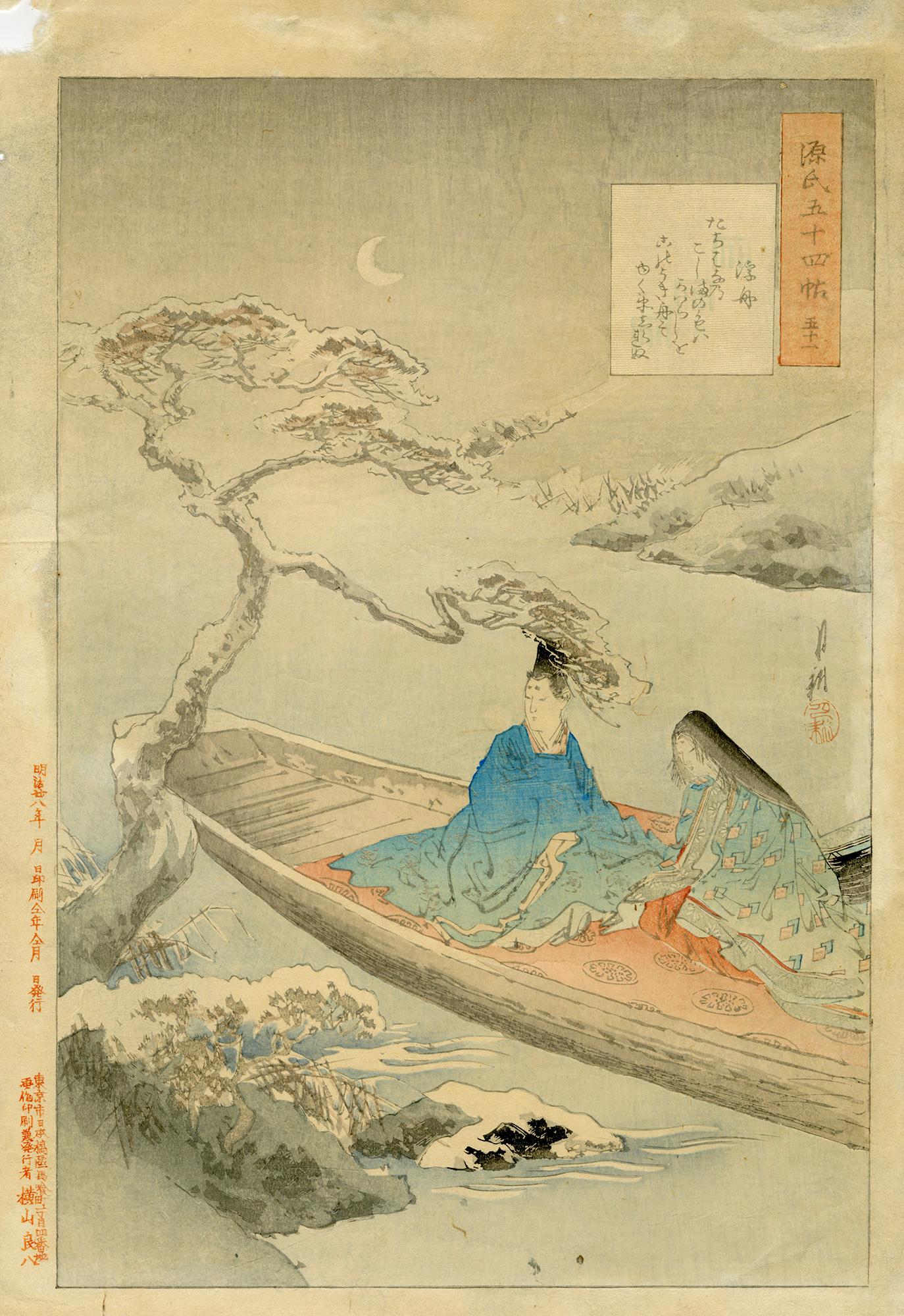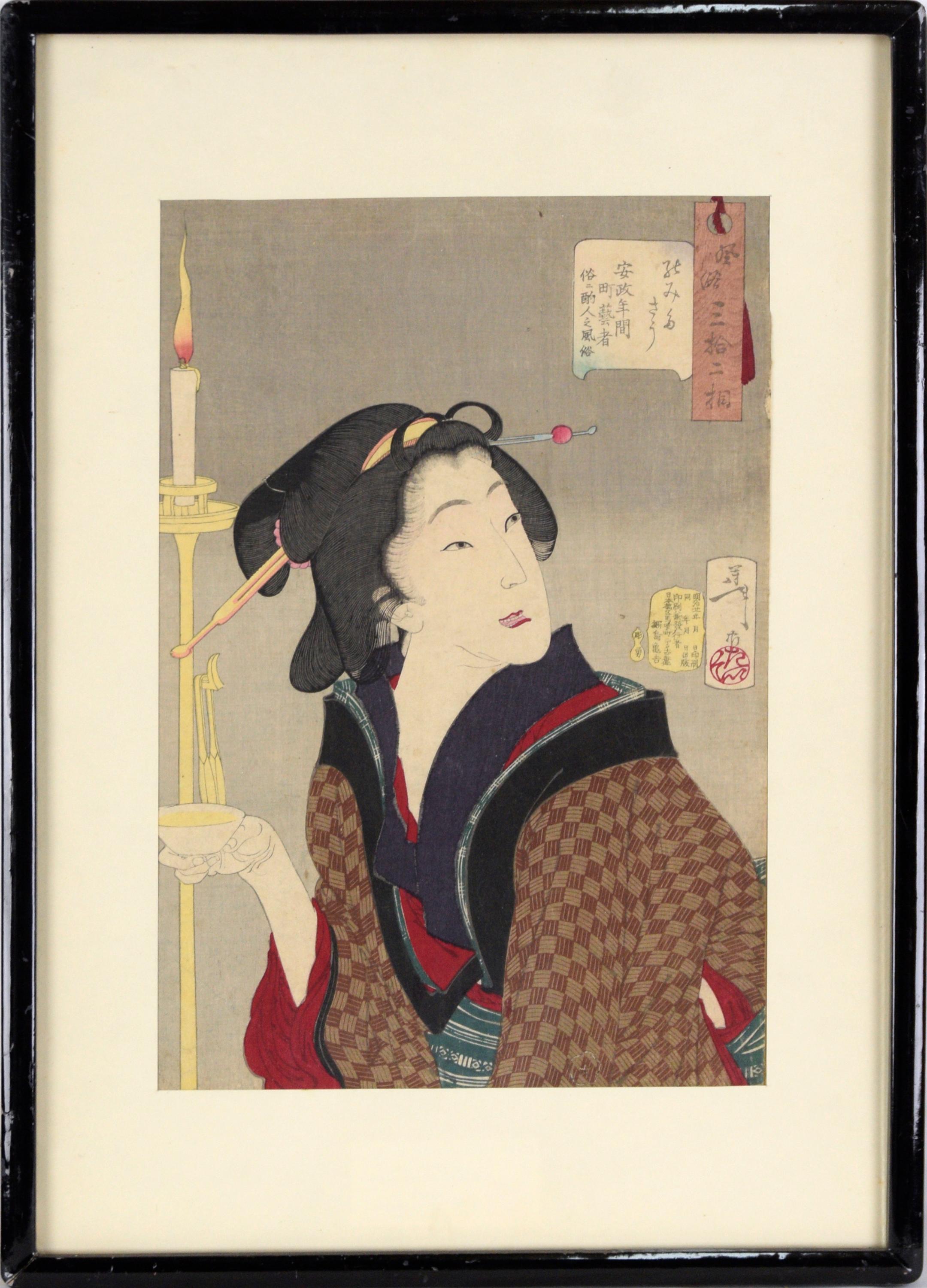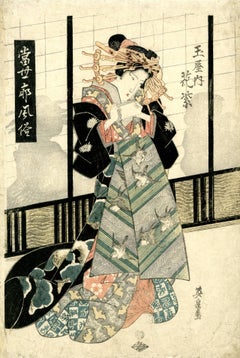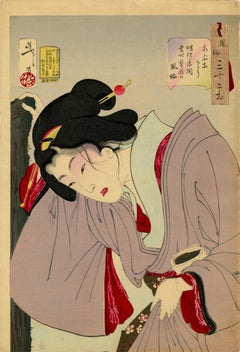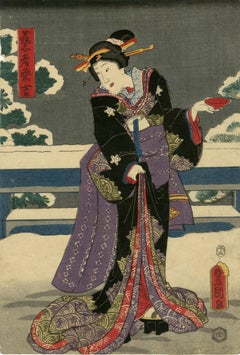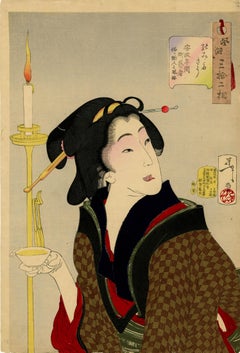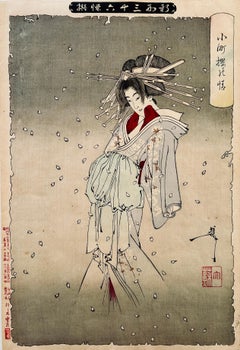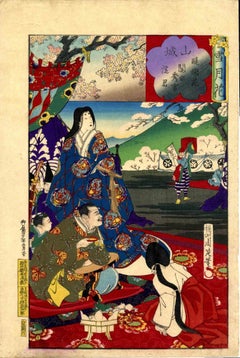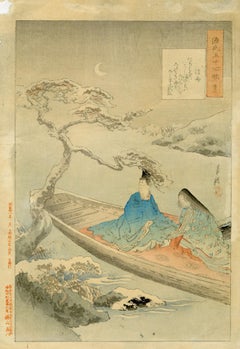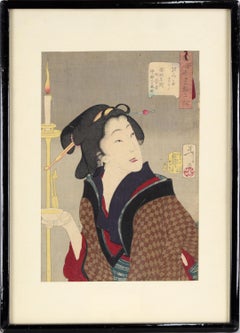Items Similar to April: Otsuyu of Yanagibashi in Wisteria Arbor at Kameido
Want more images or videos?
Request additional images or videos from the seller
1 of 7
Taiso YoshitoshiApril: Otsuyu of Yanagibashi in Wisteria Arbor at Kameido1880
1880
$1,400
£1,082.84
€1,232.75
CA$2,010.17
A$2,196.18
CHF 1,151.02
MX$26,223.05
NOK 14,566.32
SEK 13,582.79
DKK 9,206.70
About the Item
April: Otsuyu of Yanagibashi in Wisteria Arbor at Kameido
Color woodcut, 1880
From the series: "Pride of Tokyo's Twelve Months" (Tokyo jiman juni kagetsu)
Signed and sealed lower right (see photo)
Format: Oban
Publisher: Inoue
Engravers: Katata Hori Cho
Very fine impression and color
Built in 1662, Kameido Shrine is still home to the annual Fuji Matsuri or Wisteria Festival, where visitors can enjoy traditional Japanese musical performances.
Reference: Keyes, Series 426, No. 04
Provenance: Kaburagi Kiyokata (1878-1973) noted printmaker and friend of the artist
TAISO YOSHITOSHI
(1839-1892)
Taiso Yoshitoshi was born in the city of Edo (now Tokyo) just before Japan’s violent transformation from a medieval to a modern society. In the mid 19th century pressures from the United States and Europe brought an end to Japan’s two hundred years of self-imposed isolation. In 1868 a pivotal period began known as the Meiji Restoration. It was marked by the return of Imperial power, heightened militarism, a new constitution and industrial advancement, as well as social and political reform. In the midst of shifting values, woodblock print artists like Yoshitoshi struggled to create images that would satisfy the public’s changing tastes.
During the Edo period (1600-1868) woodblock prints, or Ukiyo-e (literally “pictures of the floating world”), became one of the most popular and inexpensive visual art forms in Japan. Published in the cities, visitors bought them as souvenirs and gifts from markets and street peddlers and returned with them to remote villages. From the time the first monochrome prints were published in the 1600s, Ukiyo-e represented a unique collaboration between the publisher, the artists and the public. The rising or diminishing interests of the urban merchant class largely dictated the choice of subject matter in woodblock prints.
Yoshitoshi’s confrontation with the savagery and violence of his times, especially early on in his career, was exorcised through a prolific and bloody series of prints depicting battling warriors, demons and murderers. Later in his career, however, Yoshitoshi’s work took on a distinctive stylistic change. By the 1880s, he was experimenting freely with western concepts of space, perspective and dissonant color combinations. His treatment of movement and facial features reflected a more studied and quiet observation of the human form and emotions. While continuing to choose native themes for his prints, Yoshitoshi’s approach to creating individualized portraits of townspeople, farmers, courtesans and warriors was innovative and groundbreaking. However, by the end of the Meiji Period (1868-1912), the increasing popularity of photography and lithography nearly eclipsed the public’s interest in woodblock prints. Yoshitoshi stood alone as the last great master of Ukiyo-e.
Biography courtesy International Folk Art
- Creator:Taiso Yoshitoshi (1839-1892, Japanese)
- Creation Year:1880
- Dimensions:Height: 13.75 in (34.93 cm)Width: 9.63 in (24.47 cm)
- Medium:
- Period:
- Condition:
- Gallery Location:Fairlawn, OH
- Reference Number:Seller: UK19721stDibs: LU14016133522
About the Seller
5.0
Recognized Seller
These prestigious sellers are industry leaders and represent the highest echelon for item quality and design.
Gold Seller
Premium sellers maintaining a 4.3+ rating and 24-hour response times
Established in 1978
1stDibs seller since 2013
827 sales on 1stDibs
Typical response time: <1 hour
Associations
International Fine Print Dealers Association
- ShippingRetrieving quote...Shipping from: Fairlawn, OH
- Return Policy
More From This Seller
View AllTamaya Nishi, Hana-murasaki (Purple Flower)
By Keisai Eisen
Located in Fairlawn, OH
Signed: Keisai Eisen ga;
Seal: Kiwame
Series: Contemporary Scenes in the Pleasure Quarters
Publisher: Wakasaya Yoichi
Note: This is a famous ...
Category
Early 19th Century Figurative Prints
Materials
Woodcut
Dangerous: The Appearance of a Contemporary Geisha of the Meiji Era
By Taiso Yoshitoshi
Located in Fairlawn, OH
Dangerous: The Appearance of a Contemporary Geisha of the Meiji Era
Color woodcut, 1888
Plate 28 from the series "Thirty-two Aspects of Customs and Manners" (Fuzoku Sanjuniso)
Format...
Category
1880s Figurative Prints
Materials
Woodcut
Courtesan Kumekichi
By Utagawa Kunisada (Toyokuni III)
Located in Fairlawn, OH
Courtesan Kumekichi
Color woodblock, 1858
Kabuki Actor Iwai Kumesaburo III in the role of courtesan Kumekichi, who is standing in snow hold a red sake cup
Publisher: Ohkuniya Kinjiro...
Category
1850s Other Art Style Figurative Prints
Materials
Woodcut
Thirsty: The Appearance of a Town Geisha - a So-Called Wine-Server - in the Anse
By Taiso Yoshitoshi
Located in Fairlawn, OH
Thirsty: The Appearance of a Town Geisha - a So-Called Wine-Server - in the Ansei Era
Color woodcut, 1888
Signed; Seal: Taiso (see photo)
Plate 22 from the series "Thirty-two Aspects...
Category
1880s Showa Figurative Prints
Materials
Woodcut
Inari Kozo Tasaburo- Kabuki
By Utagawa Toyokuni
Located in Fairlawn, OH
Inari Kozo Tasaburo- Kabuki
Color woodcut, c. 1820
Signed: ‘Toyokuni’
Publisher: ‘Yamamoto Heikichi’
Censor: Hama and Magome
Very good impression and color
Sheet/Image size: 15 1/2 x...
Category
1820s Other Art Style Figurative Prints
Materials
Woodcut
Kataoka Nizayemon(?)
By Utagawa Kunisada (Toyokuni III)
Located in Fairlawn, OH
Exceptional, brilliant impression and colors from the extremely rare 1st edition
Kataoka Nizayemon(?)
Color woodcut, 1860
From the series: "Contemporary Brocade Mirror Portraits"
Pub...
Category
1860s Portrait Prints
Materials
Woodcut
You May Also Like
'The Spirit of the Komachi Cherry Tree' from '36 Ghost Stories' Woodblock Print
Located in San Rafael, CA
Tsukioka Yoshitoshi (Japanese, 1839 - 1892)
'The Spirit of the Komachi Cherry Tree', or 'Komachi-Zakura no Sei' 1889
From the series '36 Supernatural Beings in New Forms' or 'Shinga...
Category
Late 19th Century Other Art Style Figurative Prints
Materials
Paper, Pigment
The Flowering Daigo - Woodcut by Toyohara Chikanobu - 1885
By Toyohara Chikanobu
Located in Roma, IT
The Flowering Daigo is an original artwork realized in 1885 by Toyohara Chikanobu (1838–1912).
Limited edition woodcut print signed on plate.
From the series "Setsu gekka", (Snow, ...
Category
1880s Modern Figurative Prints
Materials
Woodcut
$522 Sale Price
35% Off
Courtiers under a wisteria draped pine tree
Located in Middletown, NY
Tokyo: Yokoyama Ryohachi, 1892
Woodcut in ink with embossing and hand-coloring in watercolor on handmade mulberry paper, 14 1/2 x 9 7/8 inches (368 x 251 mm), ōban tate-e, the full ...
Category
Late 19th Century Edo Portrait Prints
Materials
Watercolor, Handmade Paper, Woodcut
"Thirsty: the appearance of a town geisha in the Ansei era" - Woodblock on Paper
By Tsukioka Yoshitoshi
Located in Soquel, CA
"Thirsty: the appearance of a town geisha in the Ansei era" - Woodblock on Paper
From the series "Thirty-two Aspects of Customs and Manners" (Fuzoku sanjuniso)
Lively woodblock of a...
Category
1880s Edo Figurative Prints
Materials
Paper, Ink, Woodcut
Toyohara Kunichika (1835-1900) - Woodblock, Kawacho Restaurant at Asakusa
By Toyohara Kunichika
Located in Corsham, GB
A charming Japanese woodblock print depicting three geishas playing instruments in a Kawacho restaurant. From Kaika sanjuroku kaiseki (Thirty-six famous restaurants and views of civi...
Category
Late 19th Century Figurative Prints
Materials
Woodcut
Tsukioka Yoshitoshi -- Looks Slovenly', Mannerisms of a Kyoto Geisha
By Tsukioka Yoshitoshi
Located in BRUCE, ACT
Tsukioka Yoshitoshi
Looks Slovenly', Mannerisms of a Kyoto Geisha from the Kansei Period from Thirty-Two Daily Scenes (風俗三十二相), 1888
Woodblock print
Oban
The image depicts a geisha...
Category
1880s Prints and Multiples
Materials
Woodcut
More Ways To Browse
Great Seal Of The United States
Erte Melisande
Fabio Failla
Fake Kaws
Fashion Illustration 1960s
Fernandez Diaz
Framed Scarves
France Lise Mcgurn
Francis Wheatley Engraving
Francisco Toledo Signed
Franz Laskoff
German Woodblock Prints
Goya Engraving
Haring Luna Luna
Harry Eliott
Homage To Lincoln
Hopi Maiden
Isac Friedlander
